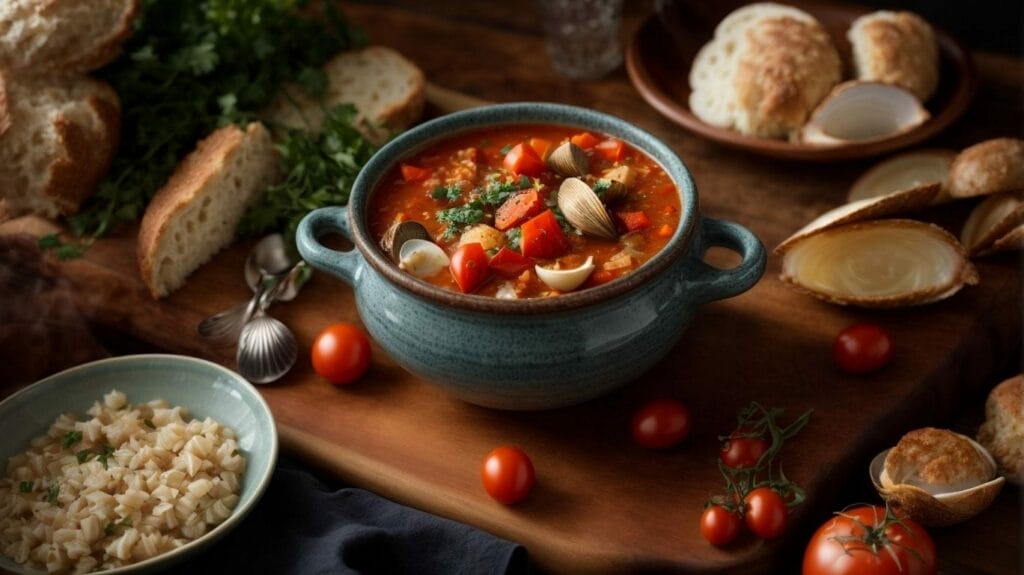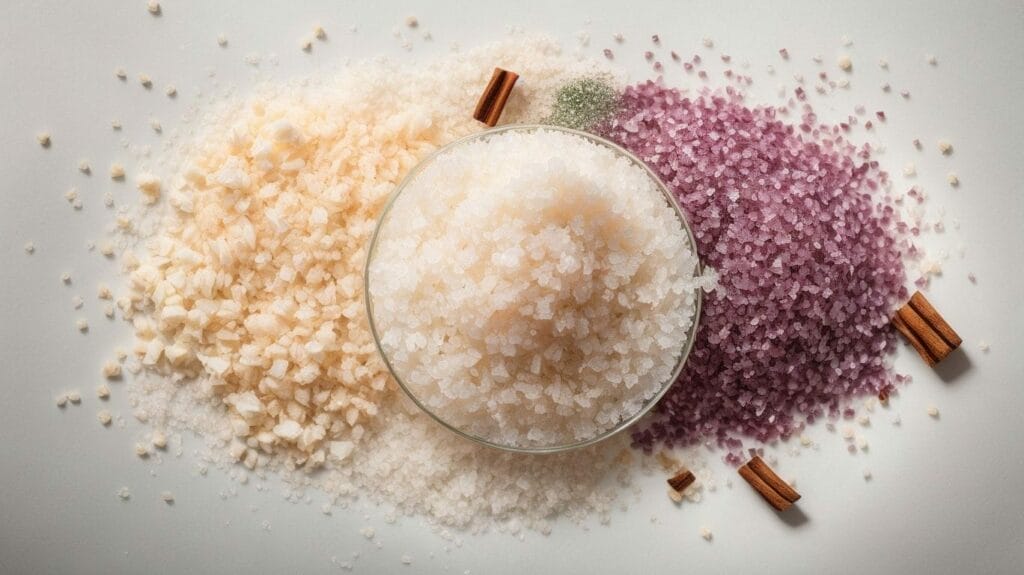Manhattan Clam Chowder, a beloved dish originating from the East Coast of the United States, is a flavorful and comforting soup that is perfect for seafood lovers. This article delves into the rich history, ingredients used, traditional recipes, variations, tips for making the perfect chowder, and serving suggestions for Manhattan Clam Chowder.
The history of Manhattan Clam Chowder is a story that dates back to the late 19th century. This tomato-based chowder gained popularity as an alternative to the cream-based New England Clam Chowder, which uses milk or cream as its base. Manhattan Clam Chowder became renowned for its vibrant red color, robust flavors, and the inclusion of diced vegetables, such as onions, celery, carrots, and potatoes.
The traditional recipe for Manhattan Clam Chowder involves several steps to achieve the perfect balance of flavors. It begins with sautéing the vegetables to release their aromas and enhance their flavors. Then, the clams and broth are added, creating a savory base for the chowder. The soup is simmered to allow the flavors to meld together, and finally, it is seasoned with herbs, spices, and other seasonings to taste.
While the traditional recipe remains a classic, there are variations of Manhattan Clam Chowder that cater to different dietary preferences. For example, some recipes offer a vegetarian twist by replacing the clams with ingredients like mushrooms or tofu while still maintaining the hearty and flavorful essence of the chowder.
To ensure that you make the perfect Manhattan Clam Chowder, there are a few tips to keep in mind. It is important to use fresh clams and properly clean them before adding them to the chowder. Proper seasoning is key, as it brings out the flavors of the clams and vegetables. Lastly, allowing the chowder to simmer for an adequate amount of time allows the flavors to develop fully.
When it comes to serving and pairing options, Manhattan Clam Chowder can be enjoyed as a standalone dish or served with crusty bread on the side. Some people even pair it with a green salad or oyster crackers for added texture and taste.
By understanding the history, mastering the traditional recipe, exploring variations, and following tips for success, you can create a delicious and satisfying bowl of Manhattan Clam Chowder to enjoy year-round.
Key Takeaways:
- Manhattan Clam Chowder: A tomato-based seafood soup originating from Manhattan, New York, typically made with clams, vegetables, and a variety of seasonings.
- Ingredients: The key ingredients in Manhattan Clam Chowder include clams, potatoes, onions, celery, carrots, tomatoes, herbs, and spices.
- Variations: There are variations of Manhattan Clam Chowder, including the notable difference between the New England and Manhattan styles. Vegetarian versions also exist.
History of Manhattan Clam Chowder
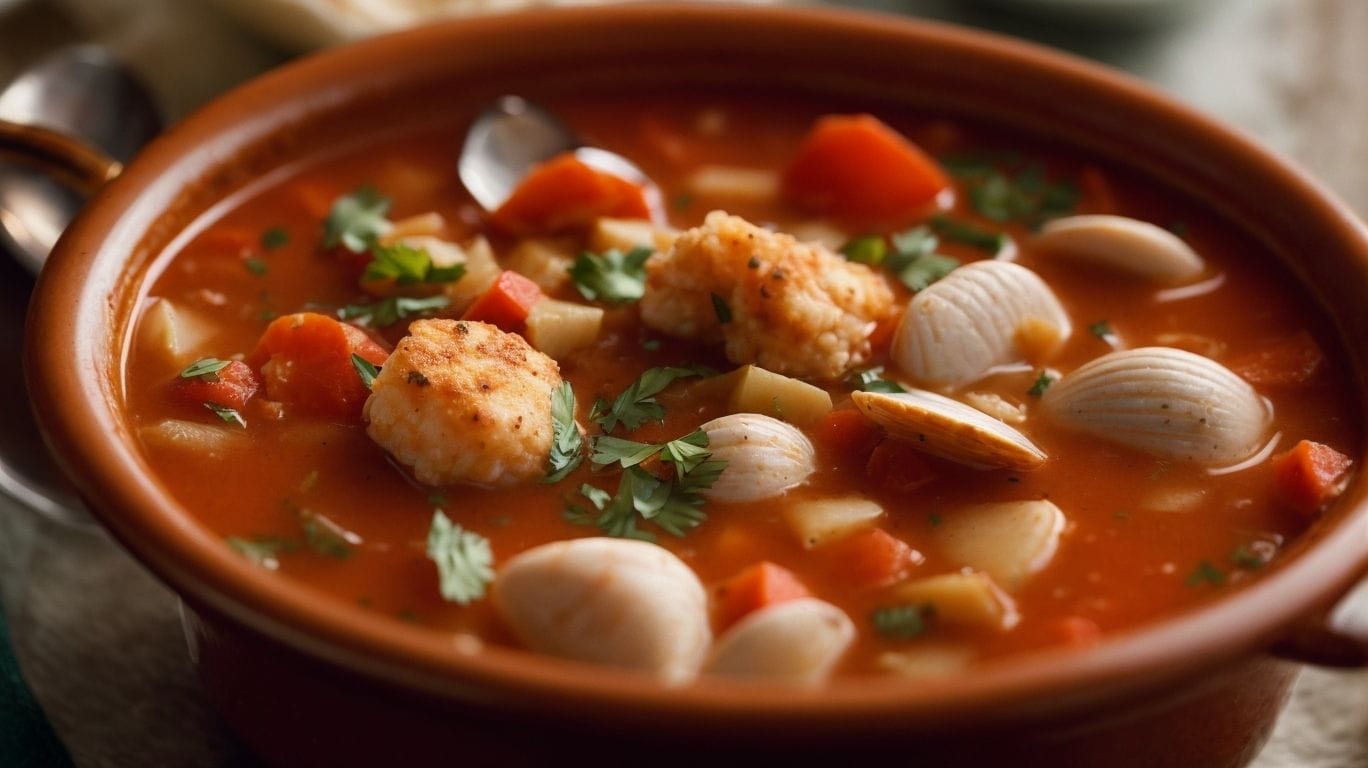
Photo Credits: Refuelrecipes.Com by Jose Campbell
The history of Manhattan clam chowder dates back to the 19th century when it first originated in the lively neighborhoods of New York City. This tomato-based soup, renowned for its delectable flavors, gained popularity among the hardworking residents who craved a wholesome and affordable meal. The inclusion of fresh clams, veggies, and aromatic herbs resulted in a distinctive taste that set it apart from its New England counterpart. Throughout the years, Manhattan clam chowder has established itself as a timeless dish cherished by seafood enthusiasts nationwide.
Ingredients Used in Manhattan Clam Chowder
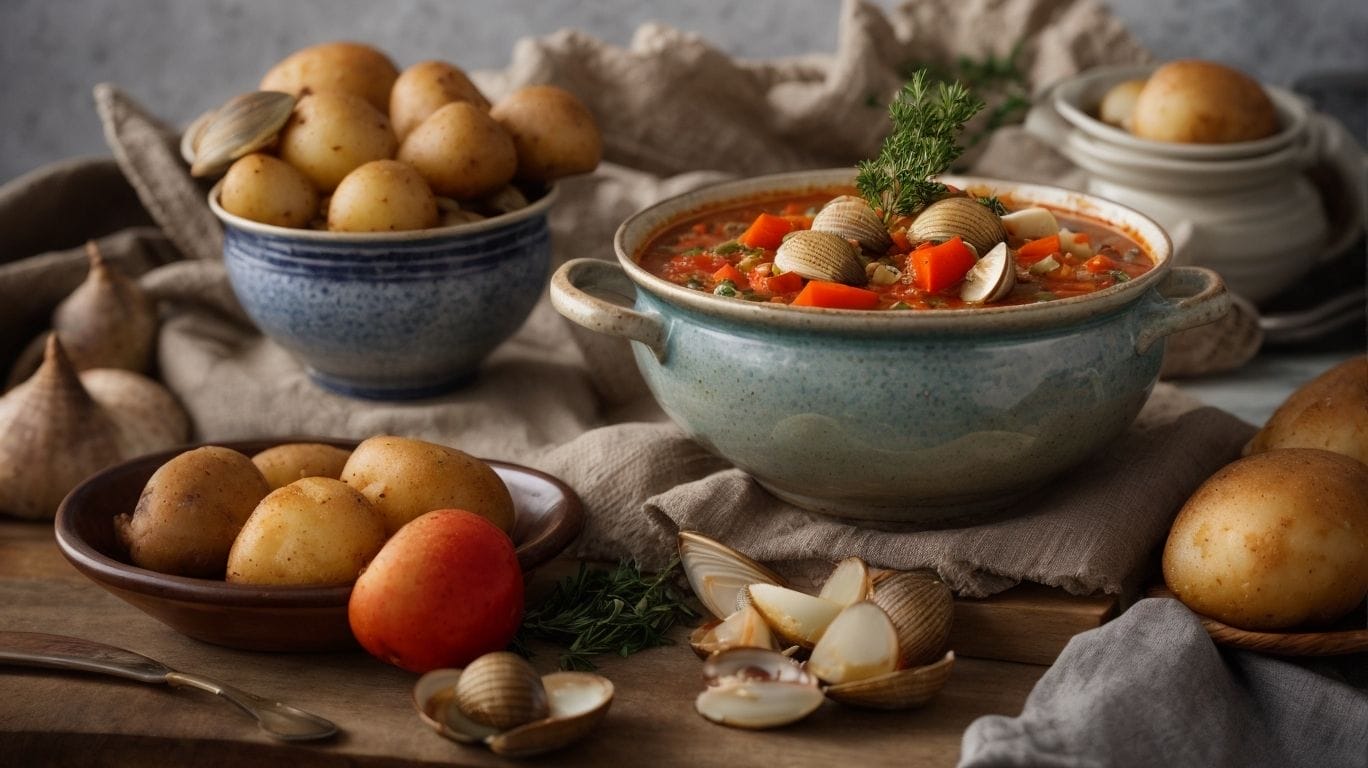
Photo Credits: Refuelrecipes.Com by Adam King
| Clams | Tomatoes | Onions |
| Potatoes | Celery | Carrots |
| Bacon | Garlic | Thyme |
| Bay leaves | Red pepper flakes | Parsley |
In Manhattan Clam Chowder, the essential ingredients used include Clams, Tomatoes, Onions, Potatoes, Celery, Carrots, Bacon, Garlic, Thyme, Bay leaves, Red pepper flakes, and Parsley. These Ingredients Used in Manhattan Clam Chowder come together to create a flavorful and hearty soup. For variations on the recipe, you can add additional vegetables or spices according to your taste preferences. Enjoy your homemade Manhattan Clam Chowder with a side of crusty bread for a delicious and satisfying meal.
Traditional Recipe of Manhattan Clam Chowder
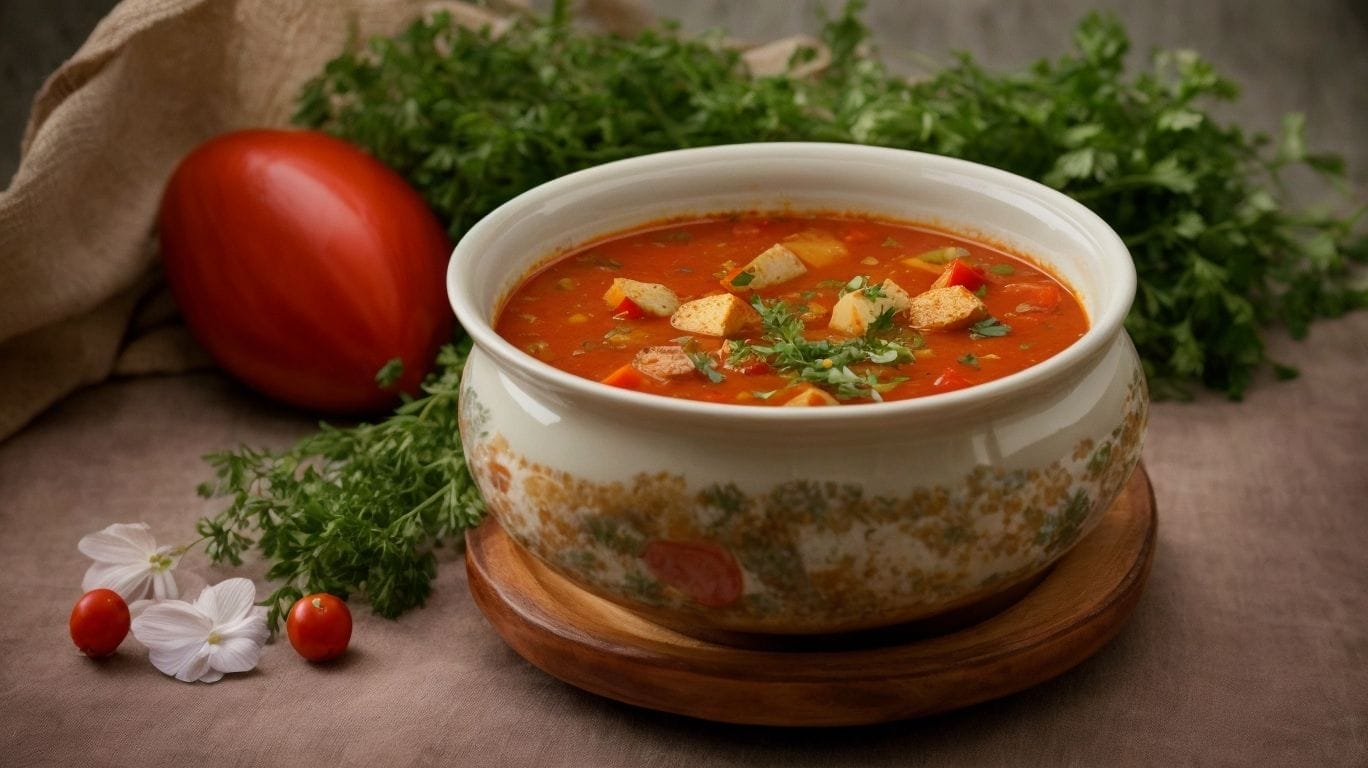
Photo Credits: Refuelrecipes.Com by Patrick Nguyen
Let’s dig into the heart of the matter – the traditional recipe for Manhattan Clam Chowder. Get ready to tantalize your taste buds as we explore each step of this beloved dish. From sautéing vegetables to adding clams and broth, followed by simmering the chowder to perfection, and finally, the crucial step of seasoning and serving. Get ready to discover the secrets behind creating a bowl of the most delicious Manhattan Clam Chowder you’ve ever tasted.
Step 1: Sauteing Vegetables
To sauté vegetables for Step 1: Sauteing Vegetables in Manhattan Clam Chowder:
- Heat a large pot or Dutch oven over medium heat.
- Add olive oil or butter to the pot and allow it to melt.
- Add diced onions, celery, and carrots to the pot.
- Sauté the vegetables for Step 1: Sauteing Vegetables until they become tender and slightly browned.
- Stir frequently to prevent any burning.
- Add minced garlic to the pot and cook for an additional minute.
- Season the vegetables with salt, black pepper, and dried thyme.
Sautéing vegetables in Step 1: Sauteing Vegetables in Manhattan Clam Chowder helps to develop deep flavors and create a delicious base for the soup.
Step 2: Adding Clams and Broth
When preparing Manhattan Clam Chowder, the second step entails adding clams and broth to the pot. Below is a straightforward guide on how to do it:
- Start by draining the canned clams or cleaning and shucking fresh clams.
- In a large pot, heat oil or butter over medium heat.
- Sauté onions, celery, and garlic in the pot until they become translucent.
- Include the clams and their juice in the pot.
- Pour in the clam or fish broth to cover the clams completely.
- Bring the mixture to a simmer and cook it until the clams are tender and fully cooked.
On a related note, a true story recounts a time when my friend attempted to make Manhattan Clam Chowder but unintentionally added an excessive amount of clam juice. This mistake resulted in an exquisitely rich and flavorful broth, which made the chowder even more delectable.
Step 3: Simmering the Chowder
During the process of making Manhattan Clam Chowder, Step 3 involves simmering the chowder to blend the flavors and allow the ingredients to cook thoroughly. Here is a step-by-step guide to simmering the chowder:
- Once the vegetables, clams, and broth are added to the pot, bring the mixture to a boil.
- Reduce the heat to low and cover the pot, allowing the chowder to simmer gently.
- Simmering the Chowder: Simmer the chowder for about 20-30 minutes or until the clams are fully cooked and the flavors have melded together.
- Stir occasionally to prevent sticking and to ensure even cooking.
- After simmering, the chowder should have a creamy consistency and be ready to serve.
Simmering the chowder is an important Step 3 as it allows the flavors to develop and creates a rich and flavorful soup.
Step 4: Seasoning and Serving
To season and serve Manhattan Clam Chowder, follow these steps:
Step 1: Season with herbs and spices
Add a pinch of dried thyme, bay leaves, and black pepper to the chowder for added flavor.
Step 2: Taste and adjust
Before serving, taste the chowder and adjust the seasoning as needed. Add more salt or spices if desired.
Step 3: Garnish
Sprinkle chopped fresh parsley on top of the chowder for a pop of color and brightness.
Step 4: Serve hot
Ladle the chowder into bowls and serve it hot. It pairs well with crusty bread or oyster crackers on the side.
Following these steps will ensure that your Manhattan Clam Chowder is seasoned to perfection and ready to be enjoyed.
Variations of Manhattan Clam Chowder
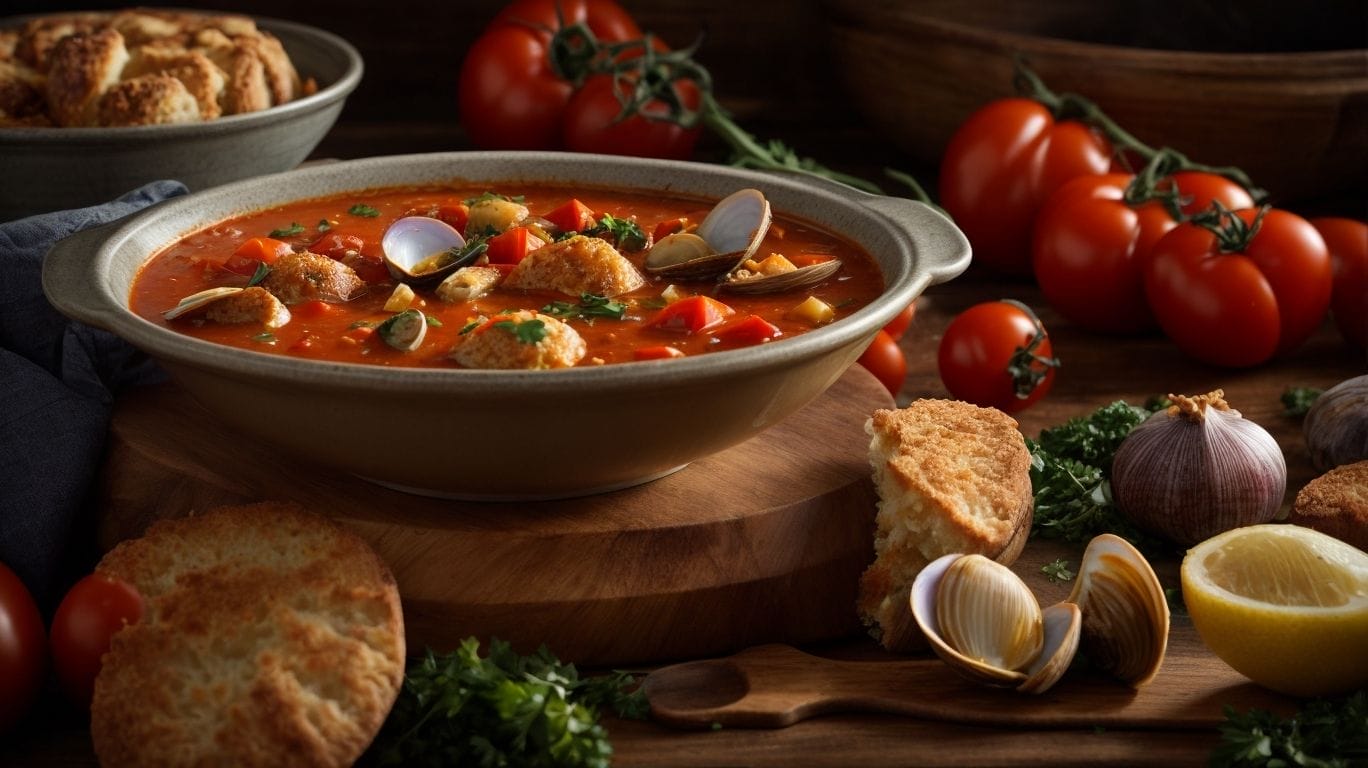
Photo Credits: Refuelrecipes.Com by Ryan Campbell
Discover the delicious world of Manhattan Clam Chowder variations! From the classic rivalry between New England and Manhattan styles to the unexpected twist of a vegetarian version, this section will take you on a flavorful journey. Uncover the contrasting flavors, ingredients, and regional preferences that distinguish these sub-sections. So, grab a spoon and get ready to dive into the diverse and compelling world of Manhattan Clam Chowder variations!
New England Clam Chowder vs Manhattan Clam Chowder
When comparing New England Clam Chowder and Manhattan Clam Chowder, there is a clear distinction in ingredients, flavor profiles, and even the regions from which they originated. The rivalry between these two chowders has been a highly debated topic for decades, with fervent supporters on both sides of the debate.
| New England Clam Chowder | Manhattan Clam Chowder |
| Rich and creamy | Broth-based |
| Includes potatoes and cream | It contains tomatoes and vegetables |
| Originated in New England | Originated in Manhattan |
Fact: The rivalry between New England Clam Chowder and Manhattan Clam Chowder has been a debate for decades, with passionate fans on both sides of the argument.
Vegetarian Manhattan Clam Chowder
Here is a table highlighting the main ingredients used in
| Ingredients | Quantity |
| Vegetable broth | 4 cups |
| Chopped celery | 1 cup |
| Diced carrots | 1 cup |
| Diced potatoes | 2 cups |
| Chopped onion | 1 cup |
| Minced garlic | 2 cloves |
| Tomato paste | 2 tablespoons |
| Dried thyme | 1 teaspoon |
| Bay leaves | 2 leaves |
| Chopped parsley | 1/4 cup |
| Vegetarian clam substitute | 2 cups |
| Cornstarch | 2 tablespoons |
| Water | 1/4 cup |
| Heavy cream (optional) | 1/2 cup |
| Salt and pepper | To taste |
Tips for Making the Perfect Manhattan Clam Chowder
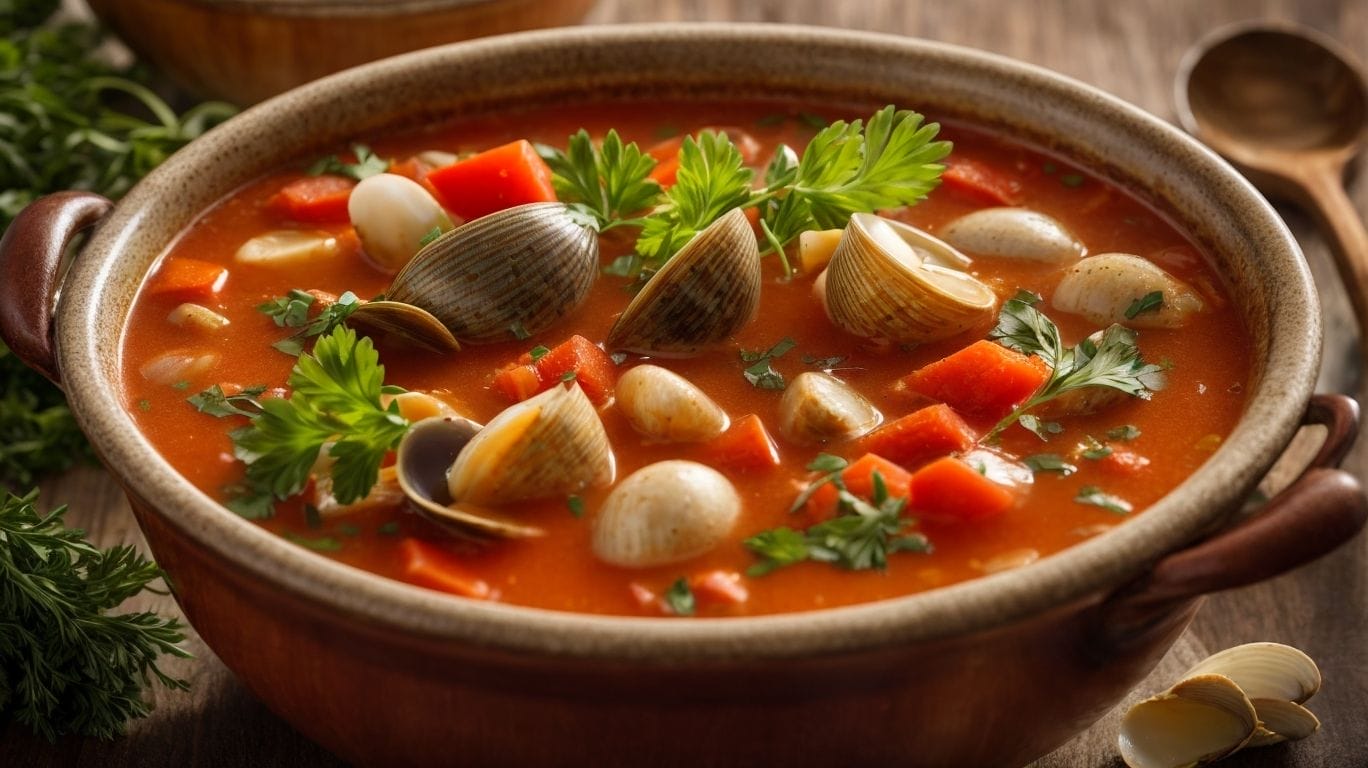
Photo Credits: Refuelrecipes.Com by Thomas Moore
Tips for Making the Perfect Manhattan Clam Chowder
Making the perfect Manhattan Clam Chowder requires attention to detail and following a few essential tips. Here are some steps to guide you:
- Start with fresh ingredients: Use fresh clams as the base for your chowder to ensure the best flavor.
- Prepare the broth: Cook the clams in a mixture of water, tomatoes, onions, and spices until they open. Then, strain the liquid and set it aside.
- Sauté the aromatics: In a separate pot, sauté onions, celery, and garlic until fragrant and softened.
- Add the potatoes: Add diced potatoes to the pot and cook until they are slightly tender.
- Combine the ingredients: Pour the reserved clam broth and the cooked clams into the pot with the vegetables and potatoes.
- Season to taste: Add herbs, spices, and salt and pepper to enhance the flavors.
- Simmer and enjoy: Allow the chowder to simmer over low heat until the flavors meld together. Serve hot with crusty bread.
Serving and Pairing Options for Manhattan Clam Chowder
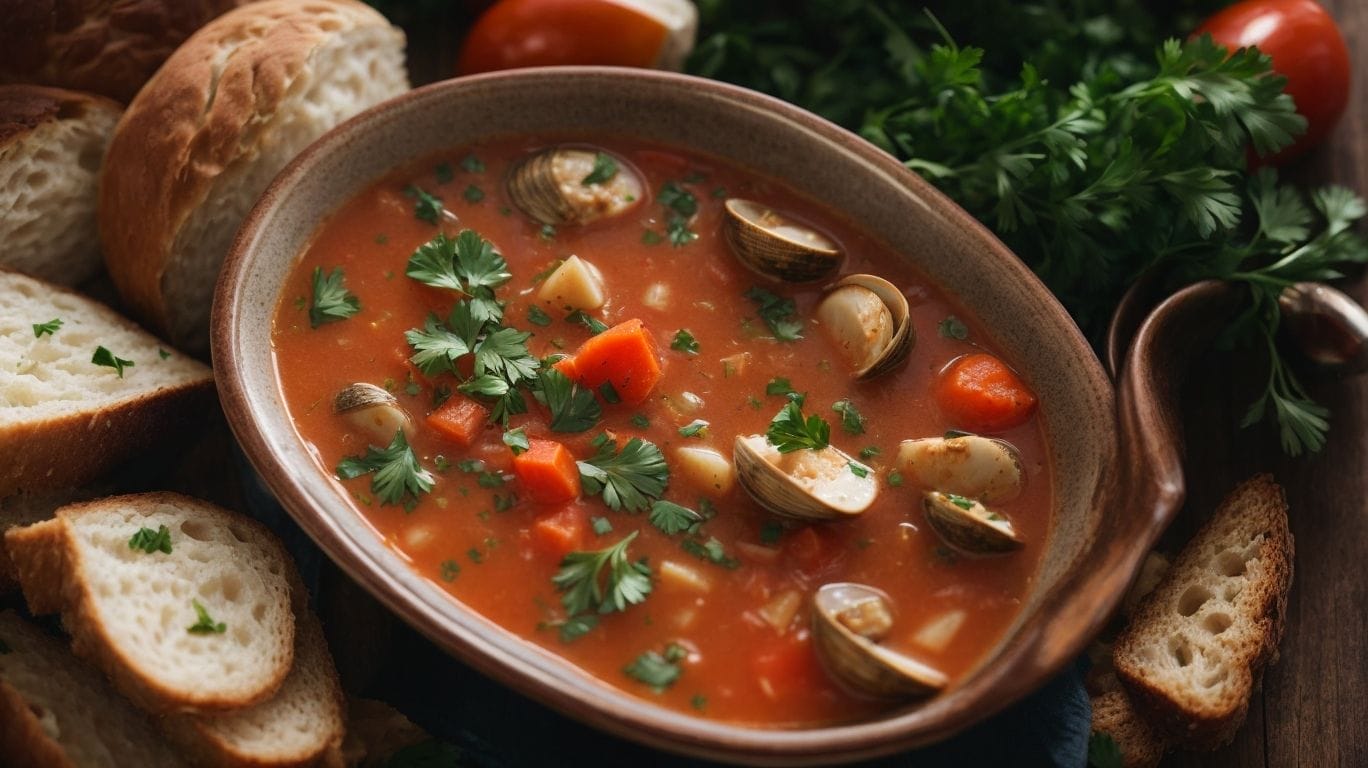
Photo Credits: Refuelrecipes.Com by Jose Hernandez
Serving and Pairing Options for Manhattan Clam Chowder can greatly enhance the dining experience and perfectly complement the flavors of this delicious dish. Consider these fantastic ideas for serving and pairing:
| Recommended Serving Options | Great Pairing Options |
|---|---|
| Bread bowl | Chardonnay wine |
| Soup cups | Pale ale beer |
| Small appetizer cups | Crisp green salad |
| Dinner plates | Grilled cheese sandwich |
| Mini mason jars | Oyster crackers and lemon wedge |
Presenting Manhattan Clam Chowder in a bread bowl or small appetizer cups adds an aesthetically pleasing touch. Pairing options such as Chardonnay wine or pale ale beer perfectly complement the rich flavors of this soup. Accompanying the chowder with a crisp green salad or a grilled cheese sandwich provides a well-balanced meal. Alternatively, for a more relaxed and casual approach, serve the chowder in mini mason jars with oyster crackers and a refreshing lemon wedge, which adds a playful twist to the dish.
Some Facts About Manhattan Clam Chowder:
- ✅ Manhattan Clam Chowder is a savory and hearty soup (Source: Dinner at the Zoo)
- ✅ It is made with clams, bacon, vegetables, and potatoes in a tomato-based broth (Source: Dinner at the Zoo)
- ✅ Manhattan Clam Chowder is often served as an appetizer or main course (Source: Dinner at the Zoo)
- ✅ Canned clams can be used for convenience and great flavor (Source: Dinner at the Zoo)
- ✅ The soup can be stored in the refrigerator for up to 3 days or frozen for up to 2 months (Source: Dinner at the Zoo)
